30 sept 2015
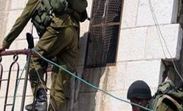
Soldiers invade various communities in the West Bank
Palestinian medical sources in the southern West Bank city of Hebron have reported, Wednesday, that scores of children suffered the effects of tear gas inhalation, during clashes that took place near a local school, south of the city.
The sources said the soldiers, stationed near Tareq Bin Ziad School, fired dozens of gas bombs and concussion grenades targeting children walking to a number of schools, south of the city, to force them away.
The children then hurled stones and empty bottles on the soldiers, while the army fired more gas bombs and concussion grenades.
Local medics provided the wounded Palestinians with the needed medical treatment.
In addition, soldiers invaded Surif town, northwest of Hebron, and kidnapped one Palestinian, identified as Bilal Eghneimat, 25 years of age, after storming his home and violently searching it.
Also on Wednesday at dawn, several military vehicles invaded the towns of Marka, Ya’bad and Deir Abu Da’if, in the northern West Bank district of Jenin, and searched a number of homes.
In addition, soldiers invaded Beit Sahour city, in the West Bank district of Bethlehem, and occupied an under-construction residential building in Thahret an-Nada area.
Eyewitnesses said around 10 soldiers occupied the rooftop, especially since it overlooks a nearby Israeli military camp.
Palestinian medical sources in the southern West Bank city of Hebron have reported, Wednesday, that scores of children suffered the effects of tear gas inhalation, during clashes that took place near a local school, south of the city.
The sources said the soldiers, stationed near Tareq Bin Ziad School, fired dozens of gas bombs and concussion grenades targeting children walking to a number of schools, south of the city, to force them away.
The children then hurled stones and empty bottles on the soldiers, while the army fired more gas bombs and concussion grenades.
Local medics provided the wounded Palestinians with the needed medical treatment.
In addition, soldiers invaded Surif town, northwest of Hebron, and kidnapped one Palestinian, identified as Bilal Eghneimat, 25 years of age, after storming his home and violently searching it.
Also on Wednesday at dawn, several military vehicles invaded the towns of Marka, Ya’bad and Deir Abu Da’if, in the northern West Bank district of Jenin, and searched a number of homes.
In addition, soldiers invaded Beit Sahour city, in the West Bank district of Bethlehem, and occupied an under-construction residential building in Thahret an-Nada area.
Eyewitnesses said around 10 soldiers occupied the rooftop, especially since it overlooks a nearby Israeli military camp.

Tens of Palestinians were wounded in clashes with Israeli soldiers Tuesday in protests against Israel's attacks on al Aqsa and in solidarity with hunger striking prisoners.
The Palestinian political and Islamic parties issued a shared statement Monday night, calling on Palestinians to demonstrate throughout the West Bank. The interesting new twist in this statement was the call to demonstrate in contact areas with Israeli soldiers, including near checkpoints and the entrances to cities.
A general strike was further called for Tuesday afternoon.
In Ramallah hundreds of Palestinians clashed with Israeli soldiers at the northern entrance to the city, where an Israeli checkpoint adjacent to the Beit El settlement is located. Soldiers shot live and rubber-coated steel bullets, injuring 18. Israeli soldiers further invaded the northern area of Ramallah, designated as Area A and ostensibly under full security control of the Palestinian Authority (PA).
Some 100 Palestinians demonstrated in the northern entrance to Bethlehem, clashing with soldiers. Seven were wounded by rubber-coated steel bullets, and soldiers closed this entrance to the city.
Ten Palestinians were wounded by rubber-coated steel bullets in the Bab el Zaweya area of Hebron, the separation zone between the Israeli-controlled downtown area and the west side of Hebron, under PA control. Dozens of others were overcome from the effects of tear gas. Israeli soldiers shut down much of this area, preventing local residents from moving.
Demonstrators in Bethlehem and Ramallah called on the Palestinian Authority to stop its coordination with Israel, particularly on the security level.
Numerous commentators noted how these demonstrators remind them of the first and second Palestinian intifadas. Monday night's statement by the political and Islamic parties is the first time in a long while that the parties issued a joint call for action against the occupation. This is reminiscent of 1987, when parties worked together during the first intifada. Secondly, the call for demonstrators to protest in contact areas is reminiscent of the beginning of the second Intifada, when the spark began from Jerusalem's al Aqsa mosque and demonstrations erupted in the contact zones throughout the West Bank.
The Palestinian political and Islamic parties issued a shared statement Monday night, calling on Palestinians to demonstrate throughout the West Bank. The interesting new twist in this statement was the call to demonstrate in contact areas with Israeli soldiers, including near checkpoints and the entrances to cities.
A general strike was further called for Tuesday afternoon.
In Ramallah hundreds of Palestinians clashed with Israeli soldiers at the northern entrance to the city, where an Israeli checkpoint adjacent to the Beit El settlement is located. Soldiers shot live and rubber-coated steel bullets, injuring 18. Israeli soldiers further invaded the northern area of Ramallah, designated as Area A and ostensibly under full security control of the Palestinian Authority (PA).
Some 100 Palestinians demonstrated in the northern entrance to Bethlehem, clashing with soldiers. Seven were wounded by rubber-coated steel bullets, and soldiers closed this entrance to the city.
Ten Palestinians were wounded by rubber-coated steel bullets in the Bab el Zaweya area of Hebron, the separation zone between the Israeli-controlled downtown area and the west side of Hebron, under PA control. Dozens of others were overcome from the effects of tear gas. Israeli soldiers shut down much of this area, preventing local residents from moving.
Demonstrators in Bethlehem and Ramallah called on the Palestinian Authority to stop its coordination with Israel, particularly on the security level.
Numerous commentators noted how these demonstrators remind them of the first and second Palestinian intifadas. Monday night's statement by the political and Islamic parties is the first time in a long while that the parties issued a joint call for action against the occupation. This is reminiscent of 1987, when parties worked together during the first intifada. Secondly, the call for demonstrators to protest in contact areas is reminiscent of the beginning of the second Intifada, when the spark began from Jerusalem's al Aqsa mosque and demonstrations erupted in the contact zones throughout the West Bank.
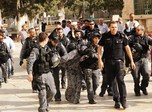
Dozens of Israeli fanatics, led by coordinator of Israel’s so-called temple mount organizations, Arnon Segal, broke into Muslims’ holy al-Aqsa Mosque early Wednesday morning.
A horde of Israeli fanatics stormed holy al-Aqsa Mosque at the early morning hours while an Israeli army chopper was hovering at a low altitude over the holy site.
According to the head of the heritage and manuscripts department at al-Aqsa, Radwan Amr, the Israeli occupation police have been chasing down the male and female Muslim sit-inners at al-Aqsa, forcing them out of the Mosque in such a remarkably aggressive manner.
Local sources told the PIC that the Israeli occupation officers attacked the al-Aqsa supervision personnel and threatened to arrest them at the Maghareba Gate.
A Muslim girl was kidnapped from al-Aqsa plazas after she was heavily beaten by the Israeli occupation soldiers.
Over recent days, the Israeli occupation forces and vandals stepped up sacrilegious assaults on the holy al-Aqsa Mosque—the third holiest site in Islam—and tightened military grip around the necks of the peaceful Muslim sit-inners who have been maintaining vigil at the Mosque.
A horde of Israeli fanatics stormed holy al-Aqsa Mosque at the early morning hours while an Israeli army chopper was hovering at a low altitude over the holy site.
According to the head of the heritage and manuscripts department at al-Aqsa, Radwan Amr, the Israeli occupation police have been chasing down the male and female Muslim sit-inners at al-Aqsa, forcing them out of the Mosque in such a remarkably aggressive manner.
Local sources told the PIC that the Israeli occupation officers attacked the al-Aqsa supervision personnel and threatened to arrest them at the Maghareba Gate.
A Muslim girl was kidnapped from al-Aqsa plazas after she was heavily beaten by the Israeli occupation soldiers.
Over recent days, the Israeli occupation forces and vandals stepped up sacrilegious assaults on the holy al-Aqsa Mosque—the third holiest site in Islam—and tightened military grip around the necks of the peaceful Muslim sit-inners who have been maintaining vigil at the Mosque.
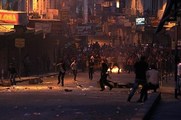
A Palestinian child and two journalists sustained injuries and choked on tear gas overnight Tuesday after the Israeli occupation forces (IOF) rolled into the southern West Bank city of al-Khalil and aggressively disbanded a group of Palestinian unarmed protesters.
Local sources told a PIC news reporter that the journalists Ali al-Ja’ba and Anas Abu Rmeileh choked on tear gas canisters that were randomly unleashed by the IOF during the clashes that broke out in the Old City of al-Khalil.
The Israeli occupation troops sealed off the access road to the al-Ibrahimi Mosque with concrete roadblocks, setting the stage for break-ins by extremist settlers into the Islamic sacred place of worship.
The occupation troops have also come down heavily on the peaceful Muslim congregation, preventing them from entering the Mosque to perform their prayers.
According to local sources, hundreds of fanatic Israelis stormed the al-Ibrahimi Mosque on Tuesday amid heavy police escort.
Meanwhile, the Palestinian child Tareq Abu Ayash sustained bullet injuries during the clashes that flared up in al-Khalil’s northern town of Beit Ummar.
A number of Palestinian civilians also sustained breathing disorders in the confrontations that rocked al-Khalil’s southern area.
Eyewitnesses said the Israeli troops targeted the unarmed Palestinian demonstrators and civilian homes with randomly-shot spates of rubber bullets and tear gas grenades before they propped up military reinforcement across the area.
Mass-rallies swept the Occupied West Bank on Tuesday in protest at Israeli attacks on the holy al-Aqsa Mosque and the peaceful Muslim sit-inners.
Local sources told a PIC news reporter that the journalists Ali al-Ja’ba and Anas Abu Rmeileh choked on tear gas canisters that were randomly unleashed by the IOF during the clashes that broke out in the Old City of al-Khalil.
The Israeli occupation troops sealed off the access road to the al-Ibrahimi Mosque with concrete roadblocks, setting the stage for break-ins by extremist settlers into the Islamic sacred place of worship.
The occupation troops have also come down heavily on the peaceful Muslim congregation, preventing them from entering the Mosque to perform their prayers.
According to local sources, hundreds of fanatic Israelis stormed the al-Ibrahimi Mosque on Tuesday amid heavy police escort.
Meanwhile, the Palestinian child Tareq Abu Ayash sustained bullet injuries during the clashes that flared up in al-Khalil’s northern town of Beit Ummar.
A number of Palestinian civilians also sustained breathing disorders in the confrontations that rocked al-Khalil’s southern area.
Eyewitnesses said the Israeli troops targeted the unarmed Palestinian demonstrators and civilian homes with randomly-shot spates of rubber bullets and tear gas grenades before they propped up military reinforcement across the area.
Mass-rallies swept the Occupied West Bank on Tuesday in protest at Israeli attacks on the holy al-Aqsa Mosque and the peaceful Muslim sit-inners.
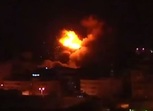
The Israeli Air Force fired, on Wednesday at dawn, several missiles targeting different areas in the besieged Gaza Strip, causing significant property damage.
Media sources in Gaza said the army fired one missiles into a site, southwest of Gaza city, causing serious property damage, while many families suffered anxiety attacks.
The air force fired another missile targeting an area, east of Gaza city, also causing significant damage, but no injuries.
In addition, one Israeli missile struck a shed in the Sudaniyya area, northwest of Gaza city, destroying it, and causing damage to several nearby structures.
Two more missiles were fired into an agricultural land, north of Beit Lahia, in the northern part of the Gaza Strip.
The Israeli army claimed a shell, fired from Gaza, was successfully intercepted by the Iron Dome system, and that the Code Red siren system was sounded in various areas in the Hof Ashkelon Regional Council and Ashdod.
Media sources in Gaza said the army fired one missiles into a site, southwest of Gaza city, causing serious property damage, while many families suffered anxiety attacks.
The air force fired another missile targeting an area, east of Gaza city, also causing significant damage, but no injuries.
In addition, one Israeli missile struck a shed in the Sudaniyya area, northwest of Gaza city, destroying it, and causing damage to several nearby structures.
Two more missiles were fired into an agricultural land, north of Beit Lahia, in the northern part of the Gaza Strip.
The Israeli army claimed a shell, fired from Gaza, was successfully intercepted by the Iron Dome system, and that the Code Red siren system was sounded in various areas in the Hof Ashkelon Regional Council and Ashdod.

The Gaza Strip was attacked at least 696 times on different occasions since the August 2014 ceasefire, said Tobias Ellwood, the UK Parliamentary Under Secretary of State for the Foreign and Commonwealth Office, according to the Middle East Monitor.
During a parliamentary session, Labour MP Alex Cunningham asked "how many times the Israeli military has opened fire into Gaza since August 2014; and what steps his Department is taking to prevent future such incidents?"
"We are aware of Israeli forces responding to illegal rocket fire from Gaza with 29 strikes since the 26 August 2014 Gaza ceasefire agreement.
"According to figures from the UN Office for the Coordination of Humanitarian Affairs in the Occupied Palestinian Territory, Israeli forces have opened fire into the Gaza Access Restricted Areas on land and sea on at least 696 occasions since then," Ellwood stated in response.
He added that British officials in Tel Aviv have raised their concerns over the Israel Defence Force's use of live fire in Gaza with the Israeli Government.
"We are continuing to urge the parties to prioritise progress towards reaching a durable solution for Gaza," Ellwood said.
During a parliamentary session, Labour MP Alex Cunningham asked "how many times the Israeli military has opened fire into Gaza since August 2014; and what steps his Department is taking to prevent future such incidents?"
"We are aware of Israeli forces responding to illegal rocket fire from Gaza with 29 strikes since the 26 August 2014 Gaza ceasefire agreement.
"According to figures from the UN Office for the Coordination of Humanitarian Affairs in the Occupied Palestinian Territory, Israeli forces have opened fire into the Gaza Access Restricted Areas on land and sea on at least 696 occasions since then," Ellwood stated in response.
He added that British officials in Tel Aviv have raised their concerns over the Israel Defence Force's use of live fire in Gaza with the Israeli Government.
"We are continuing to urge the parties to prioritise progress towards reaching a durable solution for Gaza," Ellwood said.
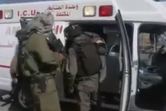
Child, 12 Years Of Age, Kidnapped In Hebron
Israeli soldiers attacked, Tuesday, several Palestinian ambulances while transporting wounded Palestinians to hospitals, in Ramallah, kidnapped one Palestinian after dragging him out of the ambulance, and attempted to abduct another.
Medical sources said at least two Palestinians were shot with rubber-coated steel bullets, and dozens suffered the effects of tear gas inhalation, after the soldiers assaulted hundreds of Palestinians protesting the ongoing Israeli invasions into the Al-Aqsa Mosque in occupied Jerusalem.
The soldiers stopped Palestinian ambulances, trying to transfer injured residents to hospitals in Ramallah, and kidnapped a wounded Palestinian, identified as Mohammad Ouri, after forcibly removing him from the ambulance.
They also attacked another ambulance, transferring a wounded Palestinian, but were unable to abduct him.
The assaults took place near the Beit El roadblock, north of Ramallah, when the soldiers assaulted dozens of protesters, including various political leaders of different Palestinian factions.
The army fired rounds of live ammunition, rubber-coated steel bullets, concussion grenades and gas bombs, in addition to spraying the protesters with wastewater mixed with chemicals.
In Hebron, in the southern part of the West Bank, soldiers kidnapped a Palestinian child, identified as Bassel Issa Shawaheen, 12 years of age, after breaking into his family's home and searching it.
Israeli soldiers attacked, Tuesday, several Palestinian ambulances while transporting wounded Palestinians to hospitals, in Ramallah, kidnapped one Palestinian after dragging him out of the ambulance, and attempted to abduct another.
Medical sources said at least two Palestinians were shot with rubber-coated steel bullets, and dozens suffered the effects of tear gas inhalation, after the soldiers assaulted hundreds of Palestinians protesting the ongoing Israeli invasions into the Al-Aqsa Mosque in occupied Jerusalem.
The soldiers stopped Palestinian ambulances, trying to transfer injured residents to hospitals in Ramallah, and kidnapped a wounded Palestinian, identified as Mohammad Ouri, after forcibly removing him from the ambulance.
They also attacked another ambulance, transferring a wounded Palestinian, but were unable to abduct him.
The assaults took place near the Beit El roadblock, north of Ramallah, when the soldiers assaulted dozens of protesters, including various political leaders of different Palestinian factions.
The army fired rounds of live ammunition, rubber-coated steel bullets, concussion grenades and gas bombs, in addition to spraying the protesters with wastewater mixed with chemicals.
In Hebron, in the southern part of the West Bank, soldiers kidnapped a Palestinian child, identified as Bassel Issa Shawaheen, 12 years of age, after breaking into his family's home and searching it.
29 sept 2015
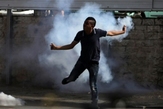
A Palestinian runs through tear gas smoke during clashes with Israeli soldiers in al-Ram, near Ramallah, at a protest over Israeli action at the Al-Aqsa Mosque compound, September 15, 2015.
General strikes announced
Some 18 Palestinians were injured on Tuesday, as Israeli forces suppressed demonstrations across the occupied West Bank in support of the Al-Aqsa Mosque.
Twelve Palestinians were injured as Israeli forces suppressed a protest near Ramallah, with three demonstrators reportedly injured by live fire, according to Ma'an.
Demonstrators had marched from the center of Ramallah to the illegal Israeli settlement of Beit El north of el-Bireh to protest ongoing violations and clashes at the Jerusalem holy site. Israeli forces fired tear gas, water canons, live fire, and rubber-coated steel bullets at the demonstrators.
Dozens suffered tear gas inhalation, including journalists who were covering the demonstration. PLO Executive Committee member Wasil Abu Yousef urged the international community to stop Israeli restrictions and violations at Al-Aqsa, as a general strike across the occupied West Bank saw stores close for two hours in solidarity with the holy site.
Amin Shouman, head of a Palestinian prisoners' committee, said popular mobilization will continue in support of the Al-Aqsa Mosque and Palestinians jailed by Israel.
An Israeli army spokeswoman said around 300 Palestinians marched near Beit El, with Israeli forces using riot dispersal means before firing rubber-coated bullets at the "main instigators."
She confirmed that seven Palestinians were hit.
In Bethlehem, dozens of youths suffered tear gas inhalation as Israeli forces suppressed a protest near Aida refugee camp, while in the nearby village of Tuqu, dozens of schoolchildren suffered from tear gas inhalation after Israeli forces opened fire at a demonstration in support of al-Aqsa.
Clashes were also reported in Tulkarem as Israeli forces fired tear gas at demonstrators marching in solidarity with the Al-Aqsa Mosque.
The demonstrations followed sporadic clashes between Israeli security forces and Palestinians in Jerusalem's Old City, with tensions heightened as Jews celebrated the Sukkot holiday.
Israeli forces on Tuesday denied Palestinians entry to the Al-Aqsa Mosque compound for the third straight day, while dozens of Jews entered the site in celebration of the Jewish holiday.
A series of Jewish religious holidays, including the eight-day Sukkot festival that began on Sunday evening, have seen large numbers of Jewish worshipers visit the flashpoint compound.
At least 22 Palestinians were injured on Monday, during clashes at the holy site, with further clashes expected during the coming days.
Palestinians have expressed fears that Israel is seeking to change rules governing the site, with far-right Jewish groups pushing for more access to the compound and even efforts by fringe organizations to erect a new temple.
General strikes announced
Some 18 Palestinians were injured on Tuesday, as Israeli forces suppressed demonstrations across the occupied West Bank in support of the Al-Aqsa Mosque.
Twelve Palestinians were injured as Israeli forces suppressed a protest near Ramallah, with three demonstrators reportedly injured by live fire, according to Ma'an.
Demonstrators had marched from the center of Ramallah to the illegal Israeli settlement of Beit El north of el-Bireh to protest ongoing violations and clashes at the Jerusalem holy site. Israeli forces fired tear gas, water canons, live fire, and rubber-coated steel bullets at the demonstrators.
Dozens suffered tear gas inhalation, including journalists who were covering the demonstration. PLO Executive Committee member Wasil Abu Yousef urged the international community to stop Israeli restrictions and violations at Al-Aqsa, as a general strike across the occupied West Bank saw stores close for two hours in solidarity with the holy site.
Amin Shouman, head of a Palestinian prisoners' committee, said popular mobilization will continue in support of the Al-Aqsa Mosque and Palestinians jailed by Israel.
An Israeli army spokeswoman said around 300 Palestinians marched near Beit El, with Israeli forces using riot dispersal means before firing rubber-coated bullets at the "main instigators."
She confirmed that seven Palestinians were hit.
In Bethlehem, dozens of youths suffered tear gas inhalation as Israeli forces suppressed a protest near Aida refugee camp, while in the nearby village of Tuqu, dozens of schoolchildren suffered from tear gas inhalation after Israeli forces opened fire at a demonstration in support of al-Aqsa.
Clashes were also reported in Tulkarem as Israeli forces fired tear gas at demonstrators marching in solidarity with the Al-Aqsa Mosque.
The demonstrations followed sporadic clashes between Israeli security forces and Palestinians in Jerusalem's Old City, with tensions heightened as Jews celebrated the Sukkot holiday.
Israeli forces on Tuesday denied Palestinians entry to the Al-Aqsa Mosque compound for the third straight day, while dozens of Jews entered the site in celebration of the Jewish holiday.
A series of Jewish religious holidays, including the eight-day Sukkot festival that began on Sunday evening, have seen large numbers of Jewish worshipers visit the flashpoint compound.
At least 22 Palestinians were injured on Monday, during clashes at the holy site, with further clashes expected during the coming days.
Palestinians have expressed fears that Israel is seeking to change rules governing the site, with far-right Jewish groups pushing for more access to the compound and even efforts by fringe organizations to erect a new temple.
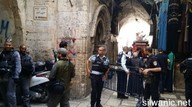
Israeli soldiers kidnapped, on Tuesday, nine Palestinians, including three women, in occupied East Jerusalem, attacked several men and women near Al-Aqsa Mosque, and prevented them from entering it.
The head of the Detainees' Parents Committee in Jerusalem, Amjad Abu 'Asab, said the army invaded homes, and violently searched them, in different neighborhoods in Jerusalem's Old City, and kidnapped three men.
The three have been identified Mohammad 'Ebada Najeeb, his brother Laith, and Rami al-Fakhouri.
The soldiers also invaded Jabal al-Mokabber, in Jerusalem, searched homes, and kidnapped 'Abed Mohammad 'Oweisat, 45, Khaled 'Oleyyan 'Oweisat, and Mohammad 'Ata 'Oweisat.
In addition, soldiers continued to block all gates leading to the Al-Aqsa Mosque, attacked many Muslim worshipers before kidnapping three women, and wounded several Palestinians.
Abu "Asab said 'Aida Saidawi was taken prisoner in the Suq al-Qattanin area, Najwa Mteir near the Council Gate, and Seena Sheikha near the Chain Gate.
The Wadi Hilweh Information Center in Silwan (Silwanic) has reported that nearly 150 Israeli extremists stormed the Al-Aqsa Mosque, through that al-Magharba Gate, under heavy army accompaniment, and that the soldiers closed most of the Al-Aqsa Mosque Gates, except for Bab Hatta, The Council Gate and The Chain Gate.
The army also installed iron barriers on the open gates of the mosque, and prevented all men and women, who are below the age of 50, from entering it, for the third consecutive day.
Silwanic said that Israeli extremists sprayed pepper spray in the faces of many Palestinians, causing several injuries, while the soldiers chased dozens of residents in an attempt to force them to leave the area.
Dozens of worshipers held dawn prayers near the Gates of the Al-Aqsa Mosque, due to Israeli restrictions preventing them from entering it.
In related news, soldiers detained a young Palestinian man, identified as Jihad Bodeir, and handed him a warrant preventing him from entering the Al-Aqsa Mosque and its courtyards for fifteen days.
The head of the Detainees' Parents Committee in Jerusalem, Amjad Abu 'Asab, said the army invaded homes, and violently searched them, in different neighborhoods in Jerusalem's Old City, and kidnapped three men.
The three have been identified Mohammad 'Ebada Najeeb, his brother Laith, and Rami al-Fakhouri.
The soldiers also invaded Jabal al-Mokabber, in Jerusalem, searched homes, and kidnapped 'Abed Mohammad 'Oweisat, 45, Khaled 'Oleyyan 'Oweisat, and Mohammad 'Ata 'Oweisat.
In addition, soldiers continued to block all gates leading to the Al-Aqsa Mosque, attacked many Muslim worshipers before kidnapping three women, and wounded several Palestinians.
Abu "Asab said 'Aida Saidawi was taken prisoner in the Suq al-Qattanin area, Najwa Mteir near the Council Gate, and Seena Sheikha near the Chain Gate.
The Wadi Hilweh Information Center in Silwan (Silwanic) has reported that nearly 150 Israeli extremists stormed the Al-Aqsa Mosque, through that al-Magharba Gate, under heavy army accompaniment, and that the soldiers closed most of the Al-Aqsa Mosque Gates, except for Bab Hatta, The Council Gate and The Chain Gate.
The army also installed iron barriers on the open gates of the mosque, and prevented all men and women, who are below the age of 50, from entering it, for the third consecutive day.
Silwanic said that Israeli extremists sprayed pepper spray in the faces of many Palestinians, causing several injuries, while the soldiers chased dozens of residents in an attempt to force them to leave the area.
Dozens of worshipers held dawn prayers near the Gates of the Al-Aqsa Mosque, due to Israeli restrictions preventing them from entering it.
In related news, soldiers detained a young Palestinian man, identified as Jihad Bodeir, and handed him a warrant preventing him from entering the Al-Aqsa Mosque and its courtyards for fifteen days.
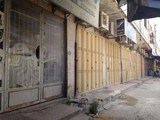
West Bank-based Palestinian national factions and organizations announced their intent to stage a two-hour general strike on Tuesday from 12 a.m. to 2 p.m. across all West Bank provinces to protest Israel’s mounting aggressions on Muslims’ the holy al-Aqsa Mosque.
The West Bank parties and activists called on all commercial institutions, shopkeepers, and schools to suspend their services for two hours.
The general strike is aimed at voicing West Bankers’ firm rebuff of the ongoing Israeli attacks and vandalism in Occupied Jerusalem and al-Aqsa Mosque.
They further pushed for mobilizing mass-participation in the projected strike in support for the al-Aqa—the third holiest shrine in Islam.
The West Bank parties and activists called on all commercial institutions, shopkeepers, and schools to suspend their services for two hours.
The general strike is aimed at voicing West Bankers’ firm rebuff of the ongoing Israeli attacks and vandalism in Occupied Jerusalem and al-Aqsa Mosque.
They further pushed for mobilizing mass-participation in the projected strike in support for the al-Aqa—the third holiest shrine in Islam.

The Emir of Qatar Sheikh Tamim bin Hamad al-Thani held the international community partly responsible for the terrorism perpetrated by the Israeli occupation in Occupied Jerusalem, pushing for urgently ceasing aggressions an al-Aqsa and lifting the siege on Gaza.
Addressing the opening meeting of the 70th session of the General Assembly at the UN headquarters in New York, the Emir said that persistent violations of al-Aqsa Mosque’s sanctity showed the absence of Israel’s will for peace.
He also said that ultra-orthodox fundamentalist and nationalist elements had taken control of Israeli policy.
“Look at what is happening in Occupied Jerusalem,” the Emir added. “They do this in order to desecrate other people’s sanctities, occupy their land and settle on it.”
“Isn’t this tantamount to religious fundamentalism? Isn’t this violence an act of terrorism carried out by radical religious forces?” he wondered.
The Emir reiterated, in a message to the international community, that ongoing failure to find a permanent and just solution for the Palestinian cause is a scar on the face of mankind.
“The international community is failing in what is less than a fair peace process, it did not even succeed in forcing the reconstruction of the Gaza Strip in the aftermath of the aggression.”
“We are providing aid to Gaza Strip until the end of implementing our commitment, but we wonder: What happened to the (Gaza reconstruction) conference and its decisions,” asked the Emir.
“The international community, represented by the Security Council, must assume its responsibilities, by taking a firm stance forcing Israel to comply with deliverables of peace, namely, halting of all forms of settlement activity in the occupied Palestinian territories, lifting the unjust siege on the Gaza Strip and to be committed to implementing the resolutions of the international legitimacy that recognize the Palestinian people’s right to regain their legitimate national rights, and establish an independent Palestinian State according to 1967- borders,” the Emir further stated.
Addressing the opening meeting of the 70th session of the General Assembly at the UN headquarters in New York, the Emir said that persistent violations of al-Aqsa Mosque’s sanctity showed the absence of Israel’s will for peace.
He also said that ultra-orthodox fundamentalist and nationalist elements had taken control of Israeli policy.
“Look at what is happening in Occupied Jerusalem,” the Emir added. “They do this in order to desecrate other people’s sanctities, occupy their land and settle on it.”
“Isn’t this tantamount to religious fundamentalism? Isn’t this violence an act of terrorism carried out by radical religious forces?” he wondered.
The Emir reiterated, in a message to the international community, that ongoing failure to find a permanent and just solution for the Palestinian cause is a scar on the face of mankind.
“The international community is failing in what is less than a fair peace process, it did not even succeed in forcing the reconstruction of the Gaza Strip in the aftermath of the aggression.”
“We are providing aid to Gaza Strip until the end of implementing our commitment, but we wonder: What happened to the (Gaza reconstruction) conference and its decisions,” asked the Emir.
“The international community, represented by the Security Council, must assume its responsibilities, by taking a firm stance forcing Israel to comply with deliverables of peace, namely, halting of all forms of settlement activity in the occupied Palestinian territories, lifting the unjust siege on the Gaza Strip and to be committed to implementing the resolutions of the international legitimacy that recognize the Palestinian people’s right to regain their legitimate national rights, and establish an independent Palestinian State according to 1967- borders,” the Emir further stated.
28 sept 2015
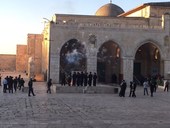
The Israeli Occupation Forces (IOF) withdrew Monday afternoon from al-Aqsa Mosque and remained stationed at Magaribeh gate, QPress media center said.
Israeli forces imposed a tight siege around al-Aqsa Mosque, preventing the entry of worshipers below the age of 50.
Earlier Monday, heavily-armed Israeli occupation troops stormed Muslims’ holy al-Aqsa Mosque and cracked down on the peaceful Muslim sit-inners.
The occupation troops further climbed over the rooftops of the Qibli Mosque before they showered the unarmed Muslim sit-inners maintaining vigil inside the Qibli place of worship with tear gas canisters and rubber bullets.
The Israeli occupation soldiers reportedly used digging machines to smash the windows of the Qibli Mosque, where snipers were heavily deployed.
The invading Israeli soldiers further attacked the female and male Muslim worshipers and attempted to force them out of the Mosque. 15 of the worshipers were injured during the attack.
Meanwhile, dozens of settlers were allowed into the Mosque amid heavy protection of police forces.
Israeli forces imposed a tight siege around al-Aqsa Mosque, preventing the entry of worshipers below the age of 50.
Earlier Monday, heavily-armed Israeli occupation troops stormed Muslims’ holy al-Aqsa Mosque and cracked down on the peaceful Muslim sit-inners.
The occupation troops further climbed over the rooftops of the Qibli Mosque before they showered the unarmed Muslim sit-inners maintaining vigil inside the Qibli place of worship with tear gas canisters and rubber bullets.
The Israeli occupation soldiers reportedly used digging machines to smash the windows of the Qibli Mosque, where snipers were heavily deployed.
The invading Israeli soldiers further attacked the female and male Muslim worshipers and attempted to force them out of the Mosque. 15 of the worshipers were injured during the attack.
Meanwhile, dozens of settlers were allowed into the Mosque amid heavy protection of police forces.
|
|
Dozens of Israeli soldiers, police officers and undercover forces, invaded on Monday morning, the Al-Aqsa Mosque in occupied Jerusalem, fired gas bombs and concussion grenades causing many injuries, before forcibly removing the worshipers, and surrounded dozens in the Al-Qibli Mosque
Eyewitnesses said around 150 soldiers and officers invaded the holy site, and started forcing the Palestinians out by firing gas bombs, concussion grenades, rubber-coated steel bullets, and several live rounds. The soldiers also assaulted many Palestinians with clubs and batons. The invasion also led to clashes between the invading troops and Palestinians, in the mosque and its courtyards. |
They Israeli attack caused fires at the main entrance of the al-Qibli mosque, but local firefighters, working for the Islamic Waqf Department, managed to contain it before it spread.
Many residents were injured, and received treatment by Palestinian medics, in the Mosque's clinic.
The army also used special tools to remove wooden doors and windows of the Al-Qibli Mosque, and hurled several concussion grenades into it.
In addition, soldiers stationed at the gates leading to Al-Aqsa, prevented dozens of worshipers from entering the mosque's courtyards, especially through Bab Hatta and the Chain Gate.
The soldiers then assaulted many Palestinians, and started pushing them away.
The removal of the worshipers was carried out while dozens of Israeli fanatics gathered nearby, and marched into the mosque's courtyards under heaving army and police accompaniment.
200 Israeli soldiers storm al-Aqsa Mosque, attack Muslim worshipers
Heavily-armed Israeli occupation troops stormed on early Monday morning Muslims’ holy al-Aqsa Mosque and cracked down on the peaceful Muslim sit-inners.
According to eye-witnesses, a horde of 200 Israeli occupation soldiers broke into the al-Aqsa Mosque at 6.47 a.m. via the Maghareba Gate, discharging heavy barrages of tear gas canisters and stun grenades in the process.
The occupation troops further climbed over the rooftops of the Qibli Mosque before they showered the unarmed Muslim sit-inners maintaining vigil inside the Qibli place of worship with tear gas canisters and rubber bullets.
The Israeli occupation soldiers reportedly used digging machines to smash the windows of the Qibli Mosque, where snipers were heavily deployed.
The invading Israeli soldiers further attacked the female and male Muslim worshipers and attempted to force them out of the Mosque.
A few hours earlier, checkpoints and barriers were randomly pitched by the Israeli occupation forces at the main entrances to the al-Aqsa, where the Muslim worshipers below the age of 50 were stopped and prevented from entering the Mosque.
A few hours later, at 7.30 a.m, the occupation officers ruled that all Muslims from different age categories be banned from entering the Mosque.
Observers said such restrictions aim at paving the way for the preplanned desecration break-ins at al-Aqsa by Israeli vandals and fanatics under the religious pretext.
Many residents were injured, and received treatment by Palestinian medics, in the Mosque's clinic.
The army also used special tools to remove wooden doors and windows of the Al-Qibli Mosque, and hurled several concussion grenades into it.
In addition, soldiers stationed at the gates leading to Al-Aqsa, prevented dozens of worshipers from entering the mosque's courtyards, especially through Bab Hatta and the Chain Gate.
The soldiers then assaulted many Palestinians, and started pushing them away.
The removal of the worshipers was carried out while dozens of Israeli fanatics gathered nearby, and marched into the mosque's courtyards under heaving army and police accompaniment.
200 Israeli soldiers storm al-Aqsa Mosque, attack Muslim worshipers
Heavily-armed Israeli occupation troops stormed on early Monday morning Muslims’ holy al-Aqsa Mosque and cracked down on the peaceful Muslim sit-inners.
According to eye-witnesses, a horde of 200 Israeli occupation soldiers broke into the al-Aqsa Mosque at 6.47 a.m. via the Maghareba Gate, discharging heavy barrages of tear gas canisters and stun grenades in the process.
The occupation troops further climbed over the rooftops of the Qibli Mosque before they showered the unarmed Muslim sit-inners maintaining vigil inside the Qibli place of worship with tear gas canisters and rubber bullets.
The Israeli occupation soldiers reportedly used digging machines to smash the windows of the Qibli Mosque, where snipers were heavily deployed.
The invading Israeli soldiers further attacked the female and male Muslim worshipers and attempted to force them out of the Mosque.
A few hours earlier, checkpoints and barriers were randomly pitched by the Israeli occupation forces at the main entrances to the al-Aqsa, where the Muslim worshipers below the age of 50 were stopped and prevented from entering the Mosque.
A few hours later, at 7.30 a.m, the occupation officers ruled that all Muslims from different age categories be banned from entering the Mosque.
Observers said such restrictions aim at paving the way for the preplanned desecration break-ins at al-Aqsa by Israeli vandals and fanatics under the religious pretext.
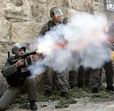
.Many Palestinians suffered the effects of tear gas inhalation, on Sunday evening, after several Israeli military vehicles invaded Teqoua’ town, east of Bethlehem. Soldiers also kidnapped a teen in Jerusalem.
The Israeli invasion into Teqoua' town led to clashes between the soldiers, and dozens of local youths; the army fired gas bombs and rubber-coated steel bullets causing many residents to suffer the effects of tear gas inhalation.
Eyewitnesses said the soldiers also invaded, and violently searched several homes, before using their rooftops as monitoring towers.
In addition, undercover soldiers invaded the al-'Eesawiyya town, in occupied Jerusalem, and kidnapped Ziad Nasser Abu Ryala, 17 years of age, as he was eating at a restaurant near his home.
On Sunday afternoon, clashes took place between Palestinians and Israeli soldiers, near the northern entrance of the ‘Aida refugee camp, in Bethlehem.
27 sept 2015
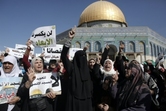
Palestinian women demonstrate in front of the Dome of the Rock after clashes in the mosque compound, on September 27, 2015.
Clashes broke out in the Al-Aqsa Mosque compound when Israeli forces stormed the holy site on Sunday morning, the last day of the Muslim Eid al-Adha holiday, witnesses said.
Witnesses told Ma'an News Agency that special Israeli forces stormed the holy site via the Moroccan and Chain gatest, firing rubber-coated steel bullets and stun grenades at Palestinian worshipers. Israeli police said that said Palestinians "threw stones and fireworks at police and border police forces," who responded with "riot dispersal means."
Calm returned to the mosque compound later in the morning and most police withdrew. Visits by Jews were stopped through the day and age restrictions on Palestinian men entering the compound lifted for the Muslim holiday.
However, tensions remained high ahead of an eight-day Jewish festival, known as the Sukkut, which begins Sunday evening and is expected to lead to an increase in Jewish visitors to the Al-Aqsa compound.
Palestinian protesters on Sunday were reportedly preparing "to defend" the mosque compound during the festival, stocking stones inside the southern mosque and planning to sleep in it. While Israeli police have prevented non-Muslims from entering the compound during the four-day Eid, which started Thursday, Israeli forces have been heavily deployed across the Old City surrounding the compound.
Recent weeks have seen severe restrictions on Palestinian worshipers wishing to enter the site, with Palestinians saying there is a newly established schedule in which Jews are allowed to tour the compound between 7 and 11 a.m., while Muslim entry is restricted.
Senior Palestinian officials have expressed concerns that Israel is restricting access to the compound in a bid to establish daily Jewish prayer, despite an agreement forbidding non-Muslim worship at the site.
The speaker of the joint Arab bloc in the Israeli Knesset, Ayman Odeh, wrote on his Facebook page on Saturday that to "counter Israeli plots to divide Al-Aqsa Mosque between Muslims and Jews," Palestinian citizens of Israel should head to the mosque in masses over the coming days.
"Now there are crowds in the blessed Al-Aqsa Mosque and these crowds will grow larger tomorrow and the day after tomorrow in particular," Odeh wrote.
He said that the goal of the gathering was "to uproot the idea of dividing Al-Aqsa and its courtyards."
He added that struggle to "protect Al-Aqsa" continues along with the struggle to end occupation, "and the Palestinian people as a whole."
Clashes broke out in the Al-Aqsa Mosque compound when Israeli forces stormed the holy site on Sunday morning, the last day of the Muslim Eid al-Adha holiday, witnesses said.
Witnesses told Ma'an News Agency that special Israeli forces stormed the holy site via the Moroccan and Chain gatest, firing rubber-coated steel bullets and stun grenades at Palestinian worshipers. Israeli police said that said Palestinians "threw stones and fireworks at police and border police forces," who responded with "riot dispersal means."
Calm returned to the mosque compound later in the morning and most police withdrew. Visits by Jews were stopped through the day and age restrictions on Palestinian men entering the compound lifted for the Muslim holiday.
However, tensions remained high ahead of an eight-day Jewish festival, known as the Sukkut, which begins Sunday evening and is expected to lead to an increase in Jewish visitors to the Al-Aqsa compound.
Palestinian protesters on Sunday were reportedly preparing "to defend" the mosque compound during the festival, stocking stones inside the southern mosque and planning to sleep in it. While Israeli police have prevented non-Muslims from entering the compound during the four-day Eid, which started Thursday, Israeli forces have been heavily deployed across the Old City surrounding the compound.
Recent weeks have seen severe restrictions on Palestinian worshipers wishing to enter the site, with Palestinians saying there is a newly established schedule in which Jews are allowed to tour the compound between 7 and 11 a.m., while Muslim entry is restricted.
Senior Palestinian officials have expressed concerns that Israel is restricting access to the compound in a bid to establish daily Jewish prayer, despite an agreement forbidding non-Muslim worship at the site.
The speaker of the joint Arab bloc in the Israeli Knesset, Ayman Odeh, wrote on his Facebook page on Saturday that to "counter Israeli plots to divide Al-Aqsa Mosque between Muslims and Jews," Palestinian citizens of Israel should head to the mosque in masses over the coming days.
"Now there are crowds in the blessed Al-Aqsa Mosque and these crowds will grow larger tomorrow and the day after tomorrow in particular," Odeh wrote.
He said that the goal of the gathering was "to uproot the idea of dividing Al-Aqsa and its courtyards."
He added that struggle to "protect Al-Aqsa" continues along with the struggle to end occupation, "and the Palestinian people as a whole."
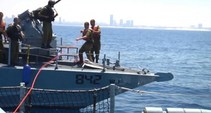
The Israeli occupation navy afternoon Saturday destroyed a Palestinian fishing boat docked within the authorized nautical miles off Khan Younis shores, in southern Gaza.
A PIC news reporter quoted local fishermen as stating that an Israeli gunboat moved toward a Palestinian fishing vessel docked some three kilometers away from Gaza shores shortly before they smashed the vessel and sunk it.
The fishermen said the boat, owned by chairman of the fishermen syndicate in Khan Younis, Fouad al-Amoudi, and three other partners of his, was attacked while disembarked in the authorized fishing zone.
A PIC news reporter quoted local fishermen as stating that an Israeli gunboat moved toward a Palestinian fishing vessel docked some three kilometers away from Gaza shores shortly before they smashed the vessel and sunk it.
The fishermen said the boat, owned by chairman of the fishermen syndicate in Khan Younis, Fouad al-Amoudi, and three other partners of his, was attacked while disembarked in the authorized fishing zone.
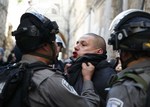
The Israeli occupation forces on early Sunday morning have come down heavily on the unarmed Muslim sit-inners at the holy al-Aqsa Mosque, resorting to excessive force to expel them and smooth break-ins by Israeli fanatics.
A PIC journalist quoted eye-witnesses as reporting that the Israeli occupation troops unlocked the al-Maghareba Gate to pave the way for settlers’ sacrilegious break-ins at the al-Aqsa.
The peaceful Muslim worshipers and sit-inners have, meanwhile, stood on guard to such desecration schemes by the fanatic Israelis, voicing their firm rebuff of any attempt to drive them out of such a sacred place of worship.
Violent clashes flared up at the al-Aqsa after hordes of extremist Israelis vandalized the plazas of the holy Mosque at the early morning hours.
The Israeli break-inners have reportedly cracked down on the non-violent Muslim congregation and sit-inners at al-Aqsa plazas, where they delivered sermons on the made-up history of the alleged temple.
The heavily-armed occupation soldiers attacked the peaceful Muslim worshipers, who kept chanting “Allah the Greatest,” with randomly-shot spates of rubber bullets and tear gas canisters, in what observes branded an unjustifiable use of armed force.
The Israeli cops further seized the IDs of a number of Palestinian girls, children, and women at the al-Aqsa Gates.
A PIC journalist quoted eye-witnesses as reporting that the Israeli occupation troops unlocked the al-Maghareba Gate to pave the way for settlers’ sacrilegious break-ins at the al-Aqsa.
The peaceful Muslim worshipers and sit-inners have, meanwhile, stood on guard to such desecration schemes by the fanatic Israelis, voicing their firm rebuff of any attempt to drive them out of such a sacred place of worship.
Violent clashes flared up at the al-Aqsa after hordes of extremist Israelis vandalized the plazas of the holy Mosque at the early morning hours.
The Israeli break-inners have reportedly cracked down on the non-violent Muslim congregation and sit-inners at al-Aqsa plazas, where they delivered sermons on the made-up history of the alleged temple.
The heavily-armed occupation soldiers attacked the peaceful Muslim worshipers, who kept chanting “Allah the Greatest,” with randomly-shot spates of rubber bullets and tear gas canisters, in what observes branded an unjustifiable use of armed force.
The Israeli cops further seized the IDs of a number of Palestinian girls, children, and women at the al-Aqsa Gates.

Palestinian medical sources have reported, Saturday, that a Palestinian teen was shot and injured, by Israeli army fire, after several military vehicles invaded Beit Forik town, east of the northern West Bank city of Nablus.
The sources said Mohammad Mojahed Hanani, 17 years of age, was shot in one of his legs, and was transferred to a local hospital for treatment.
Eyewitnesses said dozens of local youths clashed with the soldiers, after they invaded their town, and that the army fired dozens of rounds of live ammunition, in addition to rubber-coated steel bullets and gas bombs.
Beit Forik has been witnessing ongoing clashes with the army since Friday, September 18, after a young Palestinian man, identified as Ahmad Ezzat Khatatba, 26, died from his wounds, after being shot three times in the shoulder, chest and abdomen at the Beit Forik roadblock.
The sources said Mohammad Mojahed Hanani, 17 years of age, was shot in one of his legs, and was transferred to a local hospital for treatment.
Eyewitnesses said dozens of local youths clashed with the soldiers, after they invaded their town, and that the army fired dozens of rounds of live ammunition, in addition to rubber-coated steel bullets and gas bombs.
Beit Forik has been witnessing ongoing clashes with the army since Friday, September 18, after a young Palestinian man, identified as Ahmad Ezzat Khatatba, 26, died from his wounds, after being shot three times in the shoulder, chest and abdomen at the Beit Forik roadblock.
